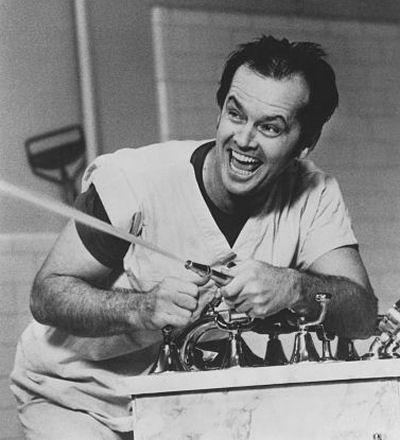If Hillary Clinton were currently our president, I have no doubt whatsoever that rightwing pundits and politicians would be comparing her to a lead character in the work I am writing about today. She would be Nurse Ratched from Ken Kesey’s One Flew Over the Cuckoo’s Nest.
Yesterday I talked about how I thought that John Steinbeck would be unimpressed with current Republican attempts to shrink the size of government and privatize Medicare. Many Tea Partiers, by contrast, might find Kesey to be a kindred soul.
I know this sounds strange given that the 1962 novel functioned as a kind of manifesto for the hippy and anti-war movements later in the decade. But that was when the younger generation was rebelling against Eisenhower-era paternalism. Now Cuckoo’s Nest can be seen as articulating Tea Party anger at “the nanny state.”
Think about it. R. P. McMurphy is a hell raiser from, if not Palin’s Alaska, then some place similar. He finds himself in a mental ward and at first considers it a sweet gig. After all, he has evaded the work farm. Soon, however, the place starts to get on his nerves and he “goes rogue” (to borrow a Palin title) and sticks his finger in the eyes of those who claim to be acting responsibly.
He is prompted to do so because his living environment saps individual initiative from the inhabitants. They are told what to eat and are denied any activities that might be dangerous. As a result, they live their lives in a soporific haze. This is especially true of narrator Chief Bromden.
In control of the ward is Nurse Ratched, backed up by a couple of African American enforcers. The white middle class men who occupy the ward have been all but deprived of their cojones by the very types of people that Rush Limbaugh rails against on a regular basis. For an example of such railing, think of the angry reaction that Michelle Obama has gotten for suggesting that Americans improve their eating habits and address the problem of childhood obesity. The cry goes up, “She wants to tell us what we can and can’t eat.” Sarah Palin defiantly brings cookies with her on a school visit.
The book ends in a violent revenge fantasy as McMurphy, unhinged by the way Ratched has driven a sensitive male patient into committing suicide, leaps upon her and sinks his fingers into her throat. As Bromden explains, he is acting out the collective anger of the patients. The Southern Poverty Law Center, which monitors hate groups in the U.S., reports that violent threats are currently at an all time high.
Czech director Milos Forman, after having lived most of his life in communist Czechoslovakia, found in One Flew Over the Cuckoo’s Nest a way of expressing his own frustrations with a controlling society. His film version won the Oscar for Best Picture in 1975.
I have always had problems with Kesey’s book, but I also know that it plugs into a deep American strain of anti-authoritarian rebellion. That’s why it is such a compelling read. At the moment America’s Right, feeling diminished and controlled, is tapping into that same strain and appears to have the wind at its back. But such an atmosphere also explains why Republican presidential candidates are having difficulty staking out mature centrist positions. When Congressional Republicans vote to end Medicare as we know it, it is as though they are calling for the hospital to be closed down.
Here’s the truth none of them are admitting and that McMurphy can’t believe when he learns it: the patients are there because they chose to come.
Better to think, like Chief Bromden, that they need to escape by hurling an impossibly heavy object through the window. Bromden even admits that he could simply walk out through the door. Measured steps are possible.
One Flew Over the Cuckoo’s Nest, in short, is a temper tantrum. But a potent one.
Go here to subscribe to the weekly newsletter summarizing the week’s posts. Your e-mail address will be kept confidential.


